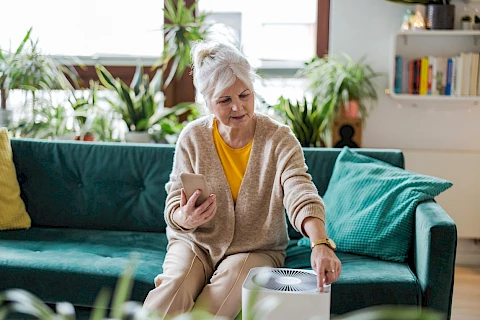
Fall can be challenging for anyone with allergies. The seasonal change brings about new allergens, including pollen, increased dust, and mold, that make life difficult. Managing these allergies is crucial to maintaining a good quality of life. Senior caregivers often play a critical role in helping their loved ones deal with those symptoms.
Common Fall Allergens
Several allergens can cause symptoms like sneezing, runny noses, and itchy eyes. Some of the most common fall allergens include:
- Ragweed pollen is one of the most common allergens in the fall. It travels easily through the air and can cause sneezing, runny noses, and itchy eyes.
- Mold spores: Damp conditions in the fall can lead to an increase in mold spores. These spores can be found both indoors and outdoors.
- Dust mites: As people turn on their heating systems, they become more active.
- Pet dander: Pet fur and skin flakes can become more noticeable when windows are closed and homes become less ventilated.
If you aren't sure what is causing a loved one's allergic reactions, a doctor can help you schedule allergy testing.
Strategies for Minimizing Allergen Exposure
Caregivers can do several things that will help minimize exposure to allergens, reducing symptoms for their senior loved ones.
Improving Indoor Air Quality
One of the best ways to manage allergies is to ensure the air quality inside the home is clean. Using air purifiers can help remove allergens from the indoor environment. Regular cleaning and dusting, including frequent vacuuming, can reduce the amount of allergens in the home. On days when pollen counts are high, it's best to keep windows closed to prevent allergens from entering the house.
Managing Outdoor Activities
It's also important to manage outdoor exposure to allergens. Checking daily pollen counts through websites and apps can enable better planning for outdoor activities. Recommend going outside in the early morning or late afternoon, when pollen levels tend to be lower. Wearing masks can help filter out pollen, while sunglasses protect eyes from allergens.
Personal Hygiene Practices
Personal hygiene helps reduce allergen exposure. After being outside, seniors should shower and change their clothes to wash allergens. Keeping bedding clean by washing it frequently can help reduce allergens in the sleeping area.
Working with Healthcare Providers
Healthcare providers are essential to the journey to helping seniors decrease allergy symptoms.
Regular Communication
Talking to healthcare providers about allergy symptoms and triggers is crucial for developing an effective management plan. Routine visits to the doctor can help monitor allergy symptoms and ensure any issues are addressed promptly. Make a list of allergy symptoms and triggers to discuss with the doctor. This can help the healthcare provider make informed recommendations.
Medication Management
Medications can be a significant part of managing allergies. Over-the-counter options like antihistamines, decongestants, and nasal sprays can help manage symptoms. In some cases, a doctor may prescribe stronger medications to help control more severe allergy symptoms.
Allergy Testing and Immunotherapy
For some seniors, allergy testing can identify specific allergens, making it easier to tailor a management plan. Immunotherapy, such as allergy shots, can be an option for reducing sensitivity to allergens over time. Discuss this with your healthcare provider to see if it’s appropriate.
Additional Care for Seniors This Fall and Beyond
Managing fall allergies for seniors is crucial for maintaining a good quality of life. Implementing strategies to minimize allergen exposure, such as improving indoor air quality and managing outdoor activities, can make a big difference. Regular communication with healthcare providers is also important for monitoring symptoms and managing medications effectively.
For personalized support in managing senior care needs, including help decreasing allergen exposure inside, contact Senior Helpers Fairfax. We serve Alexandria, Arlington, Centreville, Great Falls, and Vienna.